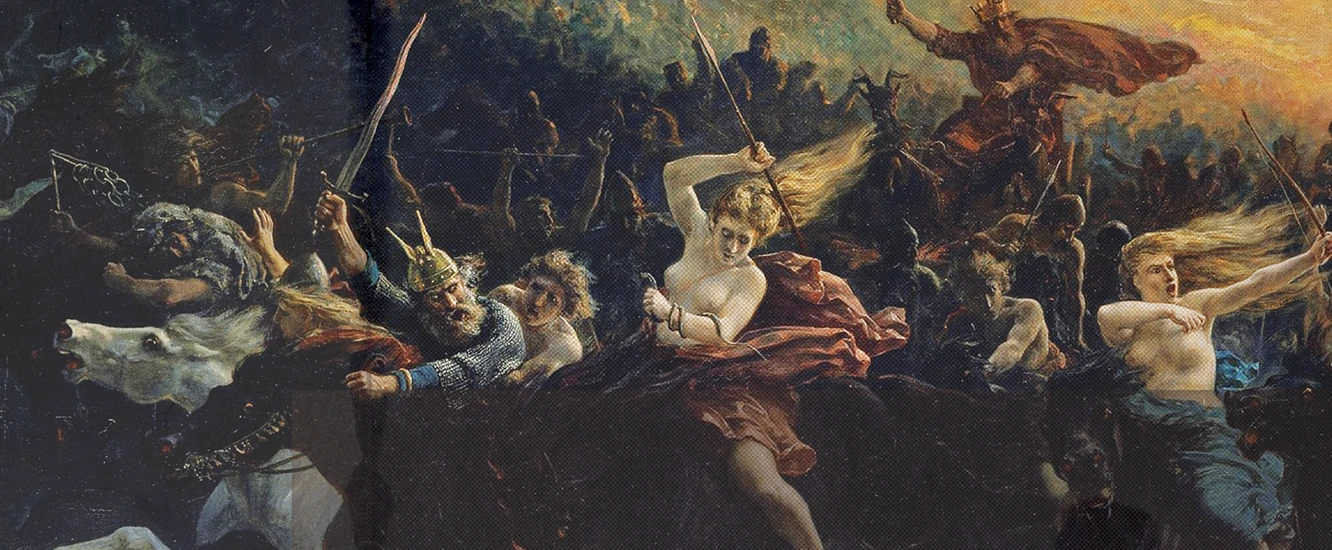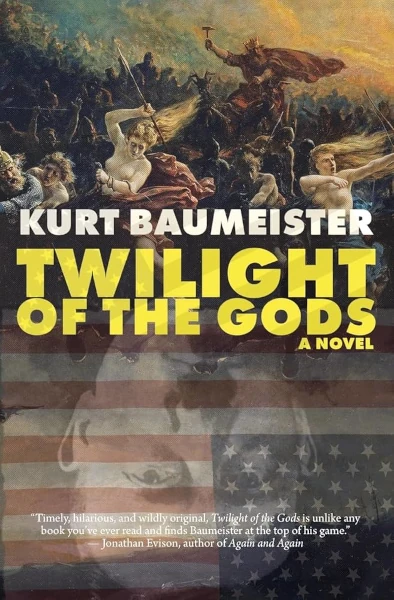
The Norse Pantheon Gets its Final Saga
Words By William M. Brandon III
A Review of Twilight of the Gods by Kurt Baumeister
In Twilight of the Gods, Kurt Baumeister strikes a fatal blow against the Norse pantheon and retools ancient mythology for our modern age of authoritarianism, mass surveillance, and failed collective civic memory. The gods (yes, even the gods) are not immune from the consequences of history. When mere mortals stop kneeling in fealty, divine power strains, weakens, and under threat of irrelevance, disappears eternally.
Like Baumeister’s previous novel, the near-future sci-fi thriller, Pax Americana, Twilight of the Gods maintains a thrilling pace and continues his focus on socio-political themes played out in cinematic scenarios. Thankfully, he maintained his wry sense of humor; his characters deliver hilarity and vulnerability in unexpected places. The writing dances deftly between satire and sincerity, without undermining either. For example, when Loki proclaims that, “It turns out Christianity absorbed us,” it lands like a punchline while meditating on an important truth: myths don’t die, they are recycled and rebranded for new ideologies and audiences.
Twilight of the Gods offers a clever narrative that evokes mythology’s core purpose, to explain through enchantment. Like the myths of old, Twilight of the Gods uses supernatural figures—gods, monsters, and mechanical Valkyries!—to make sense of uniquely human failures. In Baumeister’s telling, the gods are not metaphors for natural forces, but active agents, manipulating history. Odin (the All-Father, himself) plays a central, catastrophic role in the rise of Adolf Hitler.
Hungry for relevance and divine prestige, the pinnacle of the Norse hierarchy helps the Bastard of Austria gain power, praying fascist myth-making will resuscitate the Norse gods’ cultural dominance. Fate, the mysterious arbiter of destiny, is horrified and punishes the gods for this cosmic betrayal by stripping them of their power (mostly) and banishing them to life among mortals. The divine order collapses, and Fate vanishes. For decades, the gods are scattered, weak, and silent. As war and hatred persist in swaying modern heads of state, Odin and the power-hungry among the gods begin to claw their way into nefarious inner circles. Back to Germany, back to toying with totalitarians, back to fantasies of relevance.
Fate’s cosmic entourage, the Norns, return to Reality to tip the scales toward justice once again. They approach Loki, now living in mortal exile, with a desperate plea: help us stop your father’s new plan to empower Vekk, another rising fascist figure in modern Germany. Loki, driven by a complicated love for one of the Norns and a wary sense of justice, agrees. Baumeister expertly sets the Trickster up to be constantly beneath the Sword of Damocles and always one step ahead (or behind, whether he knows it or not).
To seduce Loki into orchestrating Odin’s downfall, Fate tempts him Odin’s throne as king of the gods. Whether Loki accepts or refuses, he understands what the Norns and Fate have long suspected: the gods’ time is over. The world no longer needs these divine overlords or their mythic scapegoats. At the heart of the narrative is a question beyond time: what happens when the old gods no longer serve us? Baumeister’s answer is as brutal as it is profound; they may kick and scream and foment chaos, but their destiny is to fade into obscurity.
Loki’s participation in the Norns’ plan could very well trigger Ragnarök…sort of. “The End,” would not come by way of firestorms, serpents, and dragons. Instead, the pantheon’s final unraveling would be quiet and stoic; with the gods dissolving into pure myth once and for all, finally mortal, finally haunted by the coming specter of death.
Twilight of the Gods doesn’t end with an optimistic cosmic balance. The gods, for all their flamboyant meddling, are essentially irrelevant. Once fiery agents of fate, they find themselves diminished, not only in power but in relevance. Baumeister doesn’t just rewrite myth—he shows us what happens when myth is co-opted, marketed, and weaponized.
Baumeister doesn’t provide closure, he states a quiet horror: truth itself is anathema and memory is a threat. The last god standing won’t go out in a blaze of glory, but with the understanding that stories—dangerous, unkillable stories—can outlast even divine power. Loki needs the truth to survive, but he finds that truth turns out to be just as unwelcome in the Human world as it was in Odin’s kingdom.
In Baumeister’s hands, Loki is more than a trickster. He’s a storyteller, a survivor, and finally, a victim of the war against ambiguity. Even as the myth collapses inward, the novel suggests what replaces it may be far worse. The old gods may be cruel and obsolete, but the systems of belief, control, and narrative manipulation that gave rise to their power will live on in darker and darker forms.
Baumeister’s mythopoeic vision is devastatingly contemporary. We see a desperate god manipulating authoritarianism to stay relevant and we see the opposite, a mortal who has learned well from divine ambition and co-opted mythology itself to rewrite history and seize control. The hunger to control reality moves from the hands of gods into the hands of mortals. The cycle repeats because we allow it to. In exposing how gods and fascists both rely on spectacle, faith, and fear, Baumeister has written a novel that feels very timely.
Baumeister renders the Norse gods forgotten, erased. There will be no more songs or stories, no new tales of adventure and glory.
Only silence.
The sound of boots.
And the crack of gunfire in the distance.
